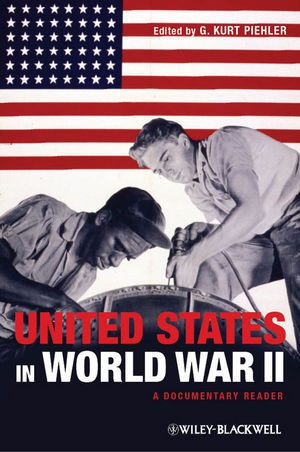Read more
Informationen zum Autor G. Kurt Piehler is Associate Professor of History at Florida State University. He is author of Remembering War the American Way (1995) and World War II (2007) and co-editor of Major Problems in American Military History (1999), The Atomic Bomb and American Society: New Perspectives (2009), and The Second World War: New Perspectives on Diplomacy, War, and the Home Front (2010). Klappentext World War II profoundly changed America: not only did it serve as the impetus for far-reaching changes in all aspects of life at home, but it also dramatically altered the perception of America internationally. This reader offers 78 essential primary documents for the period 1939-1945 that illustrate the political, diplomatic, and military history of the conflict while also highlighting the important economic, social, and cultural changes.Editor G. Kurt Piehler captures the diversity of experiences of Americans who lived through the war, including the perspectives of presidents and generals, war workers and GIs, women and men, African Americans and Asian Americans, and refugees fleeing Hitler's Germany. It includes such documents as the Atlantic Charter and Franklin Roosevelt's Congressional address requesting a declaration of war against Japan, as well as readings on the experiences of GIs on the home front, the struggle to find day care for the children of women war workers, debates over the American response to the Holocaust, and the quest for justice by ethnic, racial, and religious minorities.Bringing together well-known documents that are crucial to any study of the period with many enlightening documents that have never been published, The United States in World War II offers a balanced account of the social and political forces that combined to make the American war experience unique and transformative. Zusammenfassung World War II profoundly changed America: not only did it serve as the impetus for far-reaching changes in all aspects of life at home, but it also dramatically altered the perception of America internationally. Inhaltsverzeichnis List of Illustrations xSeries Editors' Preface xiSource Acknowledgments xivIntroduction 1Chapter 1 The Controversial War 151 Henry Stimson, Diplomatic Note, 1932 152 William E. Dodd, Letter to Franklin D. Roosevelt, 1934 163 US Congress, Excerpt from the Neutrality Act, 1935 194 Chicago Defender , "League of Nations Holds Meetings," Editorial, 1936 245 Jane Woolsey, "No Mr. Churchill!" and Mandy Butler, "Yes, Mr. Churchill!," Rutgers Anthologist , 1941 266 Franklin D. Roosevelt and Winston Churchill, "The Atlantic Charter," 1941 317 US Congress, Excerpt from Hearings, Propaganda in Motion Pictures , 1941 328 Cordell Hull Proposal to Japanese Ambassador Nomura and His Reply, 1941 37Chapter 2 Pearl Harbor and Meeting the Fight 441 Ruth A. Erickson, Recollections of Attack on Pearl Harbor, 1997 442 Eleanor Roosevelt, Script for Radio Program, 1941 463 Franklin D. Roosevelt, Address to the Joint Session of Congress, 1941 544 William Dyess, Excerpt from The Eye?]witness Account of the Death March from Bataan , 1944 565 General George Marshall to Admiral Ernest King, Memorandum, and Franklin D. Roosevelt to Harry L. Hopkins, General Marshall, and Admiral King, Memorandum, 1942 58Chapter 3 The Pacific War 631 Alvin Kernan, Excerpt from Crossing the Line: A Bluejacket ' s World Odyssey , 1994 632 John Hersey, Excerpt from "The Battle of Rivers," Life , 1942 653 US Army Research Branch, Excerpt from Report No. B?]11, "Factors Affecting Morale of Veteran Infantrymen in the Pacific," 1945 714 John Ciardi, Excerpts from Diary, 1944 735 Sam Smith, Oral History Interview Regarding Battle of Iwo Jima, 2004 76Chapter 4 The War in North Africa and Europe 791 George Marshall to Lesley McNair, Memorandum, 1942 792 James R. Forgan to Commanding General, European Theater of Operations, Memorandu...

